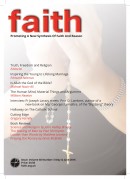Is Allah the God of the Bible?
Bishop Michael Nazir-Ali FAITH MAGAZINE May - June 2016
Is Allah the God of the Bible?
The Second Vatican Council’s declaration on relations with non-Christian religions (Nostra aetate) is shot through with a desire to be as positive as it can be about them: this tendency was both noted and complemented by Dominus Iesus of 2000 which emphasises the uniqueness and sufficiency of the Revelation in Jesus Christ.
Regarding Muslims, Nostra aetate tells us that “they worship God, who is one, living and subsistent, merciful and almighty, the Creator of heaven and earth.” Interestingly, and helpfully, it does not locate the source of such belief in the Qur’an or the Sunnah of the Prophet of Islam. So how have Muslims come by such belief?
There is a debate raging at the moment in the United States as to whether Allah can refer to the God of the Bible or whether we are referring to the concept of another being altogether. It seems clear that the Islamic doctrine of God as set out, for example, in Surah Al Ikhlas (112) is contrary to the doctrine of the Incarnation and may have been formulated precisely to deny such a possibility. Similarly, the injunction not to say “three” of God is understood to be a rejection of the doctrine of the Blessed Trinity (4:171). There is a strong emphasis on the unicity of the Divine Being, understood almost mathematically. It is true that the Trinity is misunderstood to consist of the Father, the Son and the Virgin Mary (5:119f) and Christians are supposed to believe that God is Christ (rather than that Christ is God, his eternal Word, the second Person of the Trinity). Nevertheless, even when all misunderstandings have been cleared away, we are left with a Qur’anic doctrine of God which is fundamentally incompatible with that of the New Testament.
Is that the end of the matter then, or can something more be said? Dominus Iesus, interestingly, distinguishes between “theological faith” and “belief”.This may provide a clue for a way forward: Scripture teaches that all people have some knowledge of a Supreme Being in their reading of nature and in the testimony of their own hearts, however much such knowledge may have been distorted by individual and corporate sinfulness (Rm. 1–2). When Muslims speak of Allah, are they always referring to the Qur’anic doctrine or are they speaking from this, more diffuse, background of what has been called general revelation? Indeed, can Islam itself, or another religion, reflect, however imperfectly, such a revelation or what Dominus Iesus calls “aspiration”?
Mission
Behind such theological argument lurks the question of Mission. How can we communicate the good news of Jesus Christ in this or that culture, the vocabulary of which has been formed by another religious tradition? As the Catholic theologian, Lamin Sanneh of Yale, asks: how may the Gospel be “translatable” in this or that culture? He finds this “translatability” already in the New Testament, for instance, in the use of Greek, rather than the Aramaic of Jesus and the Apostles, to further the spread of the Faith in the Graeco-Roman world. Here the term “theos” is used of the God and Father of Our Lord, in spite of its palpably pagan associations. In this the New Testament is but following its Jewish predecessors in the Gentile world. So it has been throughout the history of the Church’s mission in different cultures and at different times. This is also true, of course, of the Teutonic “god”, pressed into service by Christian missionaries to designate the Christian God, rather than the pagan deities of Northern Europe. Sanneh himself focuses on his own African background and how pre-Christian words for God are, almost universally, used of the God of the Bible. For Sanneh, such translatability is intrinsic to the Christian Faith and to its task in the world. It is this which, as Pope Benedict has said, enables the Gospel to help cultures find their true centre.
Christian meaning
Thus if Arab Christians use the term “Allah”, as they do, hopefully, they are giving it Christian content and meaning, rather than importing Qur’anic ideas into their faith. This is also important for mission and dialogue. As they seek to communicate the Gospel to their Muslim neighbours and friends, they will have a common linguistic and cultural background in which, and from which, to engage but they will also wish to transmit the uniqueness of God’s self revelation in the living, dying, rising again and teaching of Jesus the Messiah.
Rather than “knee-jerk” reactions, one way or another, we have to ask how a term is being used by Christians and non-Christians alike, whether its use has been transformed by the Christian message and whether it assists in communicating that message to the culture in which Christians find themselves. This will, indeed, cast more light on the issue and, perhaps, generate less heat! We need both Nostra aetate and Dominus Iesus to help us in thinking through such important, but difficult, questions for our times.
Dr Nazir-Ali was formerly the Anglican Bishop of Rochester and now runs the Oxford Centre for Training and Research.






